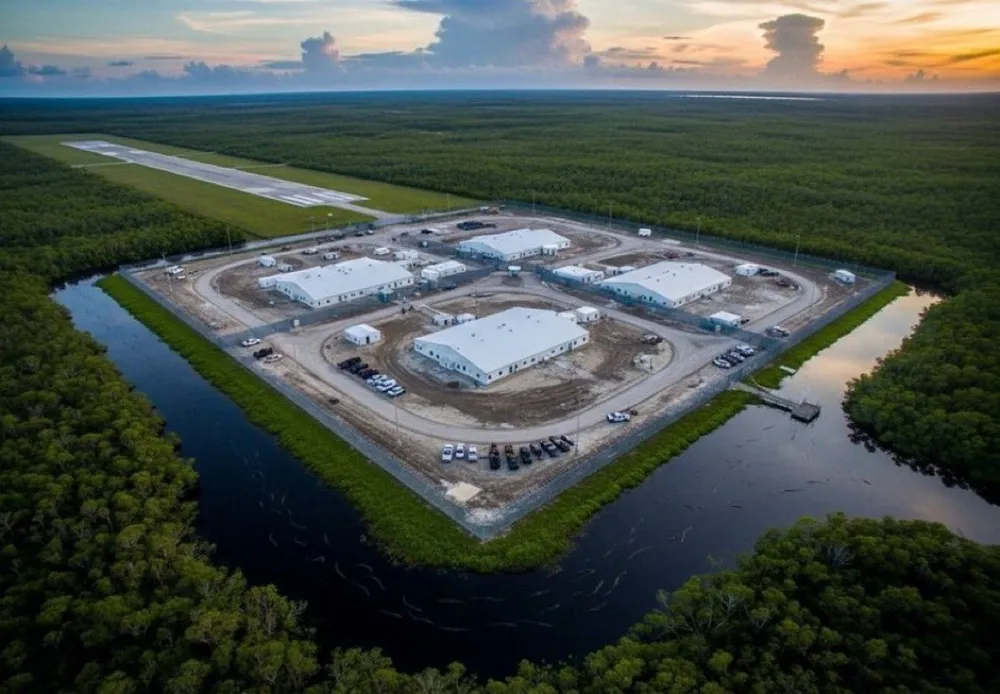The tragedy of the Argentine who was planning to "self-deport" from the US: he was arrested and sent to Trump's "Alcatraz."

Fernando Artese was planning to return to Argentina in a motorhome with his wife and daughter after living in the United States for a decade. At the beginning of the trip, he was detained on July 3 in Florida after being stopped at a police checkpoint in Jupiter Beach. His license had expired, and when authorities checked his immigration status, they discovered he was illegal.
With dual Argentine and Italian nationality, Artese was sent to the immigration detention center known as "Alligator Alcatraz" in the Everglades, a facility recently inaugurated by Donald Trump that sparked controversy over its conditions.
This new detention center, nicknamed "Alcatraz for alligators," is located on an old abandoned airfield, 72 kilometers from Miami, in the middle of a swampy area inhabited by alligators and pythons. It was built in record time as part of Trump's immigration policy and can hold up to 5,000 people.
prison.webp

The facility was presented as a "safe and secure" place, with a single entry and exit route, to expedite the mass deportation of undocumented immigrants. However, it sparked condemnation and protests from human rights organizations, environmentalists, and politicians, who denounced not only the inhumanity of the treatment but also the environmental damage to the Everglades ecosystem.
Artese has lived in Florida since 2015. In search of a better future for his family, he emigrated with his wife, Mónica Riviera, and daughter, Carla. But with the tightening of immigration policies following the arrival of Trump, they decided to return to Argentina in a motorhome , sharing the trip on a YouTube channel called Argentinomades.
On June 25, before beginning their journey, they were stopped at a police checkpoint in Jupiter Beach. Fernando's license had expired, but the bigger problem arose when they discovered his irregular immigration status : he had entered with a visa in 2014 and never regularized his status.
"It was a tough decision to return, but when Trump took office, we knew it was time," said Monica. She and her daughter are eligible for student visas. Fernando is not.
Embed - Fernando Artese and his family were planning to "self-deport" from the #UnitedStates. The plan was to leave the country in a motorhome and travel across the continent. Everything was going to be recorded on a YouTube channel. But the dream lasted only a few miles. He was detained by patrol officers in #Florida and sent to the controversial "Alligator Alcatraz" detention center for undocumented immigrants. #AlligatorAlcatraz #cnnenespañol
In 2001, he moved to Spain with Mónica. They lived for ten years in Madrid and the Canary Islands. Then, in 2014, he traveled alone to the US with an Italian passport. His ESTA visa was valid for 90 days. He stayed in Florida, where he started a security camera company.
In 2018, his wife and daughter joined him. But by then, Fernando was already in an irregular situation . "He never thought he wouldn't be able to change his status with that visa," his partner explained.
The center that accumulates complaintsAfter his arrest, Artese was transferred by ICE to the new immigration center built by the Trump administration. The facility, located in the middle of a swampy area, already has five migrant deaths under investigation. The mayor of Miami-Dade County has requested intervention.
Monica describes the experience as “like a horror movie.” Her husband shares a damp shed with 32 other people. The food, she says, is minimal: an apple, a cereal bar, chips, and a sandwich with a single slice of mortadella and a slice of cheese. “There are days you can't sleep from hunger.”
Hygiene conditions are also precarious. “They wake them up at two in the morning to bathe in boiling water, and when they come back, the air conditioning is on full blast,” Mónica explained. “There are people with COVID who aren't isolated, and Fernando is already showing symptoms like a sore throat.”
She also denounces abuse and humiliation . “They have to walk with their hands on their necks. Like dangerous criminals,” she lamented. “The saddest thing is that many, like Fernando, didn't commit any crime. He started a business, created jobs, and today he's in prison as if he were a criminal.”
While his family is trying to bring publicity to the case, Immigration and Customs Enforcement (ICE) maintains that the detainees are receiving medical care and adequate food. The Artese family, on the other hand, is demanding urgent humanitarian transfer and the opportunity for Fernando to access due process and family visits.
losandes



